Take a moment to think about the value of your business assets. Is it the price you could get if you sold all your products tomorrow? Is it the balance that remains after subtracting your liabilities? Or is it a broader concept that reflects your ability to continue serving customers in the future? For Marcus Lemonis, the lasting value of your business assets depends on three things: people, process and products.
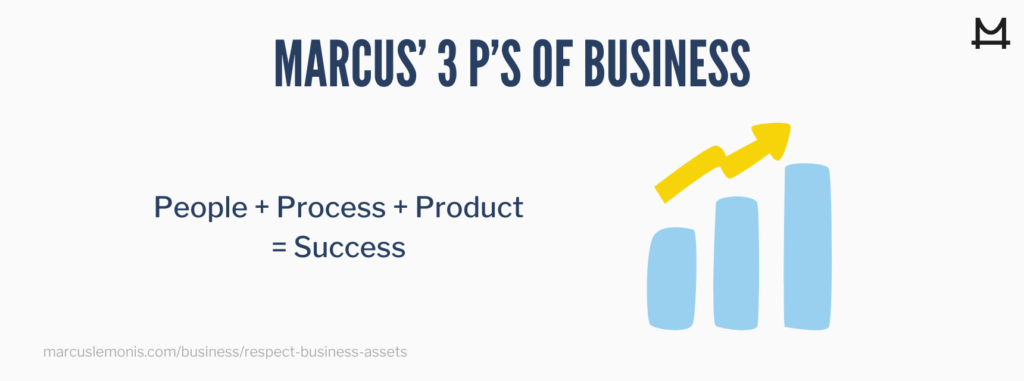
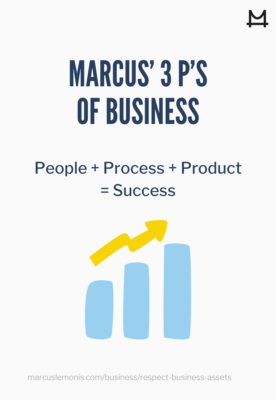
A successful business has many assets, from money in the bank to the people who produce goods and services to the customers who provide revenue. From an accountant’s point of view, assets go on the positive side of the balance sheet, while liabilities – your debts, tax obligations and payables, for instance – go on the negative side. But this basic equation may not reflect the actual value of your business or the assets that make it possible to keep growing your company.
What are Business Assets?
- Money – your cash on hand for immediate use
- Bank accounts – your checking, savings and investment balances
- Leases – on your facility or busienss equipment
- Products – your work in process and inventory
- Equity – the funds you and your partners have invested
- Property – including the buildings and facilities
- Equipment – such as the computer network, business vehicles and machinery
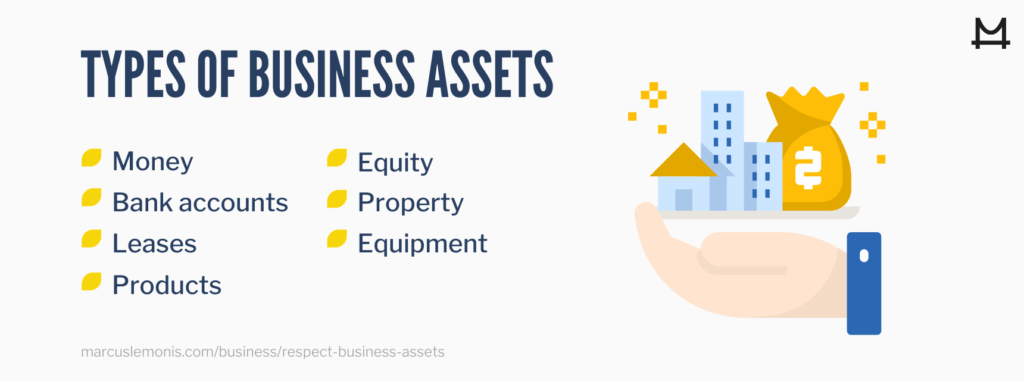
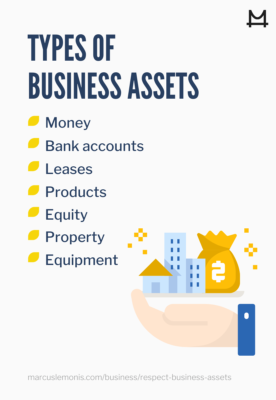
It is fairly easy to determine the value of these financial and physical business assets. For instance, you could simply look at the balance in your checking account or determine the market value of your property if you were to sell it tomorrow.
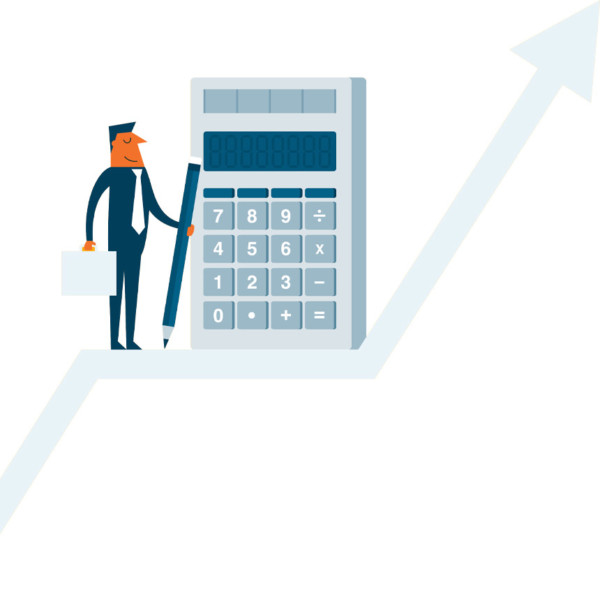
Accountants know there are other important ways to look at these types of tangible business assets. For instance, there may be tax considerations that affect their value. If you purchased new equipment this year, that asset could be subtracted from business revenue on your next income tax return. Many assets can be depreciated over time, such as your building and equipment. The depreciated value of these business assets is considered their book value – the amount entered in your accounting books. That number may or may not reflect the actual market value of those assets.
Liquidity is another consideration that is particularly important for an owner. Some business assets, like savings and investments, are highly liquid and can be sold immediately if extra funds are needed. On the other hand, real estate assets are not liquid and it could take weeks, months or even years before they could be sold to raise money.

Many Fortune 500 companies list the properties that house both their national and international operations as some of their largest assets. During downturns in the market, these are often areas they turn to in order to offset losses. AmerisourceBergen Corp. announced in 2020 it was selling its 122,000-square-foot facility in Memphis for $5 million. Another example is Pearson, a global education company that was forced to sell some of its business assets in 2017 after posting a $3.3 billion pretax loss.
Your Intangible Assets
But those physical and financial assets are far from the only valuable aspects of your business. There are also many intangible assets that can be equally or more important to your company. These types of assets include:
- Your brand, which can be among the most valuable assets in your business
- Your intellectual property, such as trademarks, patents and licensing rights
- Your customers, who provide the revenue to keep your business moving forward
- Your goodwill in community – the trust and positive expectations people have about your business
While it’s difficult to pin a solid number on the value of these business assets, always be sure to include them when thinking about the current status of your company.
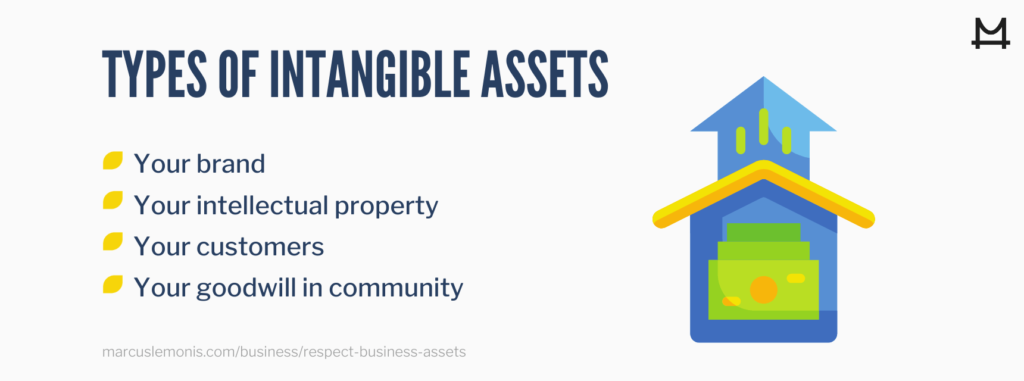
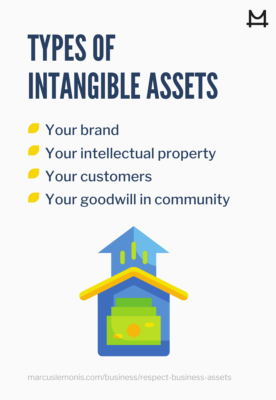
Respect Your Business Assets
But there’s another aspect to consider when thinking about your business assets. Do you treat your assets with respect? For instance, do you deplete your savings and investment accounts at the first opportunity, or do you keep those balances as high as possible? What steps are you taking to monitor and protect your brand or enforce your licensing rights? Are you treating your customers well or taking them for granted?
Marcus’ foundation for business success – people, processes, and products – provides a great framework for learning just how much you respect your tangible and intangible business assets.
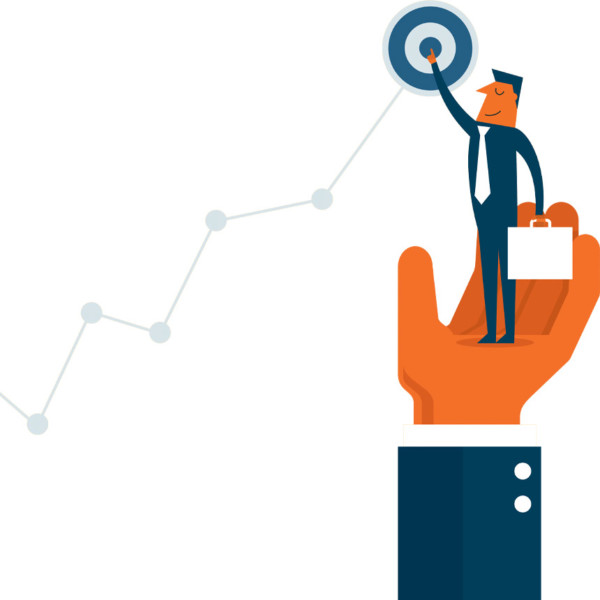
Let’s start with products. Do you focus on quality and make sure everything is up to your standards before it heads out the door? Or do you try to cut corners with less expensive ingredients or components, and try to gain market share by undercutting the competition?
Not long ago, Marcus was impressed by a Denver entrepreneur who was committed to selling high quality skateboards. He made sure every aspect of his products was top-of-the-line from the ball bearings and wheels to the composite, non-skid surface. Each board was handmade and meticulously inspected to maintain a high level of quality and craftsmanship. Although the business ultimately ran into financial trouble, there was no question about the owner’s commitment to his business assets.

You also need to respect your business processes. Do you park your inventory in an aging warehouse where your products slowly deteriorate, or do you pay a little more for a nice facility with heat and air conditioning? Your production equipment, forklifts and company vehicles need regular maintenance to avoid breakdowns. If you skimp on those expenses, you are asking for financial trouble in the future.
The same approach holds true for your business’ computer network. You need to keep the operating system up to date to avoid potential security risks, and invest in upgrades to handle the latest applications and support more devices.
When considering an investment, Marcus looks closely at how companies treat inventory and equipment. For instance, he found that the owners of a Tampa truck assembly business had placed a high value on their spare parts and assemblies. But when he visited the facility, he found old rusty parts and a warehouse in complete disarray. He discovered that the company has never taken an actual inventory and the true value of items on hand was much less than the number shown on the books. It was clear the owners did not respect their physical business assets and their business was suffering because of it.
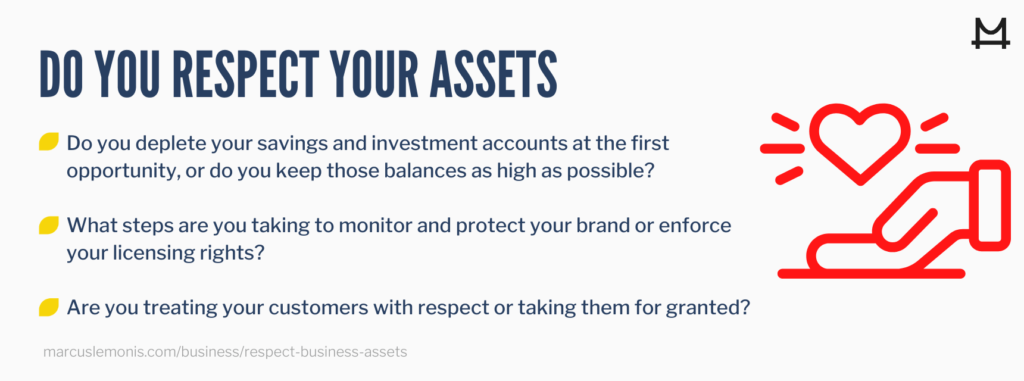
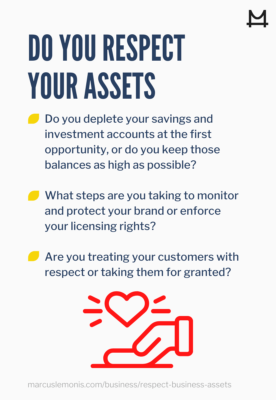
How Do You Treat Your People?
How you treat your employees, managers and partners may be the most important factor in determining whether your business succeeds or closes its doors. “Your job as the CEO of the business is to be the coach,” says Marcus. “Rather than running people under the bus, you’ve got to get them on the bus with you.”
Unfortunately, many business owners look at their people as liabilities, rather than assets. They complain about the high cost of salaries, ignore their personal requests and fail to provide the respect every person deserves. That was certainly the case when Marcus visited a Los Angeles pet grooming business. He quickly saw that the owner blamed everything that went wrong on his employees and would throw temper tantrums on a regular basis. It was no surprise to Marcus that the business was going to the dogs because the owner focused on the customers’ pets rather than grooming his hard-working employees for the future.

There are many ways you can show respect to the people who make your business a success. It begins with a merit-based hiring process based on knowledge, skills and experience, as well as the candidate’s ability to fit into your culture.
Once new people are onboard, you should allow them to do their tasks with accountability but without micromanaging. Listen to their comments, rather than ignoring what they say. Find ways to engage them in the organization, such as offering a bonus for completing an important task. Recognition is another great way to show respect for your people. Find ways to highlight individual and team accomplishments, and use these occasions to emphasize their importance to your organization.

Recognition is another great way to show respect for your people. Find ways to highlight individual and team accomplishments, and use these occasions to emphasize their importance to your organization.
Along with offering competitive salaries and benefits, you should provide training and career development opportunities for your people, encouraging them to stay with your organization. While a high turnover is ideal for assets like your products and inventory, it becomes a negative when applied to your people assets. And when your people feel undervalued or disrespected, they are likely to leave as soon as they can find another position.
Value and Respect Your Business Assets
To be successful, you need to value, manage and respect your assets. A good accountant can help you keep track of the financial values – which is always important in tracking your profitability, preparing your tax returns, and determining the sales value of your business. Just be sure to treat those assets – particularly your people, processes and products with respect. As Marcus says, “The customer is not No. 1 to me. They’re No. 2, right behind the employee.”
This article is informational only and subject to errors or omissions. As with any legal or regulatory advice, please consult your legal counsel or tax advisor to make sure you are in compliance with all and any federal, state, city or county rules and regulations. More
- Do you currently respect and value your assets appropriately?
- What can you do to improve the way you respect and value your assets?
Fortune.com. (2017, February 24). Faces down a collapse in its biggest market. Retrieved from
https://fortune.com/2017/02/24/pearson-education-earnings/Bolton, J. (2020, August 13). AmerisourceBergen puts former PharMEDium Memphis facility and equipment up for sale. Retrieved from
https://www.bizjournals.com/memphis/news/2020/08/13/fortune-500-company-puts-memphis-facility-for-sale.htmlKrantz, M. (2019, August 12). 16 companies just lost a whopping $27.7 billion… in one quarter. Retrieved from
16 Companies Just Lost A Whopping $27.7 Billion … In One Quarter





